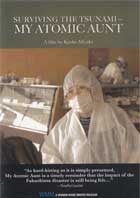
Surviving the Tsunami- My Atomic Aunt 2013
Distributed by Women Make Movies, 115 W. 29th Street, Suite 1200,New York, NY, 10001; 212-925-0606
Produced by Gregor Streiber
Directed by Kyoko Miyake
DVD, color, 52 min.
High School - General Adult
Nuclear Power Plants, Japan, Sociology, Environmental Disasters, Environmentalism
Date Entered: 06/11/2015
Reviewed by Maureen Puffer-Rothenberg, Valdosta State University, Valdosta, GAKyoko Miyake’s documentary looks at the aftermath of the 2011 Fukushima nuclear disaster through the eyes of her Aunt Kuniko, who was among thousands evacuated from the town of Namie. Kuniko’s initial loyalty to “dear TEPCO” (Tokyo Electric Power Company)--and her refusal to be angry about TEPCO’s lack of concern for safety should an earthquake occur, turns to anger as months pass without news as to whether Namie’s denizens may return to their homes.
Kuniko pins her hopes on a promised government map of safe zones, hoping to return to her wedding chapel, funeral home, and bakery—businesses she owned and managed with her husband. Kuniko and Miyake visit Namie in HAZMAT suits to assess the damage and salvage what they can. The abandoned town is spooky. Kuniko’s amusement at the state of her bakery (“Look what has become of the profiterole!”) gives way to heartbreak when she realizes her wedding chapel is too badly damaged to be saved.
A fading fishing village, Namie had for years campaigned for a nuclear power plant of its own to boost the economy; in fact land had been set aside for a plant. Kuniko now becomes staunchly anti-nuke, but says sadly that chanting and marching seem to make little difference.
Miyake notes that her Tokyo friends quickly forget about Fukushima’s earthquake, the nuclear meltdown, and devastated lives left in its wake, assuming when the headlines fade that a large-scale disaster like Fukushima is somehow “over.” Miyake’s film brings the aftermath into clearer focus, showing how individuals survive heartbreak and try to rebuild their lives with little government support. Highly recommended.